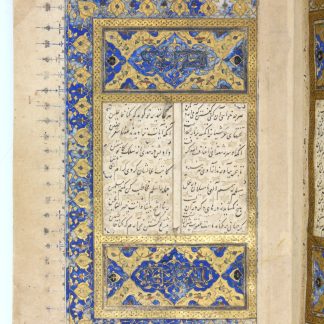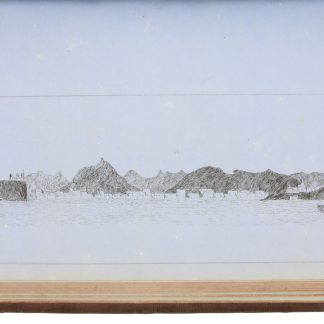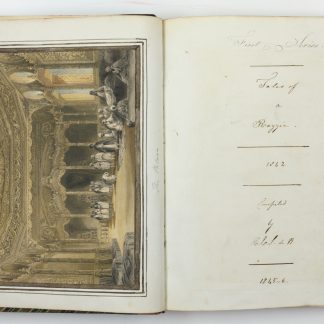
Khosrow's true tragic Romance, flecked with gold
Deval Rani Khizr Khan [or,] Ashiqa.
8vo (143 x 235 mm). 80 ff. Near complete, wanting 2 leaves (first 3 pages) at beginning, and wanting all but 4 lines of final ghazal, and also final 3 poems following that ghazal, at the end. Persian manuscript on gold-flecked paper. Black nasta'liq script with section titles in red.
$2,791.00
A manuscript of one of the most remarkable Romances by the great poet Amir Khosrow Dihlavi, not based on popular legend but telling of the real lives - and tragic ends - of two people whom Khosrow knew, and knew well. "Deval Rani Khizr Khan", also titled "Ashiqa", was commissioned by the Delhi prince Khizr Khan himself, who asked Khosrow, already established as a court poet, to write a Persian Romance based on his marriage with his wife Deval Rani, a Hindu-born princess. Though the work was famous in its time, helped establish the genre of the poetic historical epic (cf. Schimmel 965), and remains well-respected, no full translation has been made out of Persian, limiting the scope of scholarship and heightening the importance of individual manuscript copies such as this one.
Khosrow and Khizr Khan "knew each other outside of the royal court and shared similar views" (Bednar 17); in fact, they studied under the same Sufi teacher, who preached tolerance and cohabitation between Muslims and Hindus. Khizr Khan provided Khosrow with a draft of the Romance written in Hindi, and Khosrow translated and elaborated on the story to arrive at an arresting combination of historical and romantic masnavi verse, melding the two styles of which he was master.
The story of the Romance, and the story of the creation of the work itself, have all the hallmarks of great drama: the commission was made in 1314 when Khizr Khan was crown prince. His father died in January of 1316, Khizr Khan was swiftly imprisoned, blinded (an act which symbolically prevented him from ruling), and executed - all of which Khosrow would have witnessed as a citizen of Delhi. It was only after his friend's execution that Khosrow added a tragic ending to what had originally been a triumphant love story. Deval Rani, at least, outlived her part in the Romance; in Khosrow's recension she kills herself to join her dead husband, but in life, while the record is faint, she survived longer through the intrigues of the Delhi court.
From the Galerie R.G. Michel in 1912, and in the Michel private collection (1880-1963), thence to descendants.
Original leaves on gold-flecked paper pasted onto larger leaves, themselves with marginal paper repairs, waterstain. In good condition.
Boris Bednar, "The Content and the Form in Amir Khusraw's 'Duval Rani va Khizr Khan'", Journal of the Royal Asiatic Society 24, no. 1 (2014), pp. 17-35. A. Schimmel, "Amir Khosrow Dehlavi," in Encyclopædia Iranica I, Fasc. 9, pp. 963-965.





